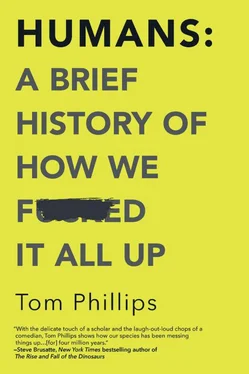Tom Phillips - Humans - A Brief History of How We F*cked It All Up
Здесь есть возможность читать онлайн «Tom Phillips - Humans - A Brief History of How We F*cked It All Up» весь текст электронной книги совершенно бесплатно (целиком полную версию без сокращений). В некоторых случаях можно слушать аудио, скачать через торрент в формате fb2 и присутствует краткое содержание. Город: Toronto, Год выпуска: 2019, ISBN: 2019, Издательство: Hanover Square Press, Жанр: История, Юмористические книги, на английском языке. Описание произведения, (предисловие) а так же отзывы посетителей доступны на портале библиотеки ЛибКат.
- Название:Humans: A Brief History of How We F*cked It All Up
- Автор:
- Издательство:Hanover Square Press
- Жанр:
- Год:2019
- Город:Toronto
- ISBN:978-1-48805-113-5
- Рейтинг книги:4 / 5. Голосов: 1
-
Избранное:Добавить в избранное
- Отзывы:
-
Ваша оценка:
- 80
- 1
- 2
- 3
- 4
- 5
Humans: A Brief History of How We F*cked It All Up: краткое содержание, описание и аннотация
Предлагаем к чтению аннотацию, описание, краткое содержание или предисловие (зависит от того, что написал сам автор книги «Humans: A Brief History of How We F*cked It All Up»). Если вы не нашли необходимую информацию о книге — напишите в комментариях, мы постараемся отыскать её.
Humans: A Brief History of How We F*cked It All Up — читать онлайн бесплатно полную книгу (весь текст) целиком
Ниже представлен текст книги, разбитый по страницам. Система сохранения места последней прочитанной страницы, позволяет с удобством читать онлайн бесплатно книгу «Humans: A Brief History of How We F*cked It All Up», без необходимости каждый раз заново искать на чём Вы остановились. Поставьте закладку, и сможете в любой момент перейти на страницу, на которой закончили чтение.
Интервал:
Закладка:
(Granted, at the time of writing this, there’s a broad awareness that the only thing that stands between us and imminent fiery nuclear annihilation is the whim of one petulant man-child or another, so who knows? I’m going to work on the assumption that you are in fact reading this book in the normal way, rather than planning to burn it for warmth as you shelter in the rubble, in which case I guess we made it to May 2019 at the very least.)
There are lots of books about humanity’s finest achievements—the great leaders, the genius inventors, the indomitable human spirit. There are also lots of books about mistakes we’ve made: both individual screw-ups and society-wide errors. But there aren’t quite so many about how we manage to get things profoundly, catastrophically wrong over and over again.
In one of those ironies that the universe seems to really enjoy, the reasons we cock it up on such a vast scale are often the exact same things that set us apart from our fellow animals and allow us to achieve greatness. Humans see patterns in the world, we can communicate this to other humans and we have the capacity to imagine futures that don’t yet exist: how if we just changed this thing , then that thing would happen, and the world would be a slightly better place.
The only trouble is… well, we’re not terribly good at any of those things. Any honest assessment of humanity’s previous performance on those fronts reads like a particularly brutal annual review from a boss who hates you. We imagine patterns where they don’t exist. Our communication skills are, uh, sometimes lacking. And we have an extraordinarily poor track record of failing to realize that changing this thing will also lead to the other thing , and that even worse thing , and oh God no now this thing is happening how do we stop it .
No matter how high humanity rises, no matter how many challenges we conquer, catastrophe is always lurking just around the corner. To pick a historical example: one moment you are Sigurd the Mighty (a ninth-century Norse Earl of Orkney), riding home in triumph from battle with the head of your slain enemy, Máel Brigte the Bucktoothed, dangling from your saddle.
The next moment, you are… well, you’re Sigurd the Mighty a couple of days later, dying from an infection caused when the protruding bucktooth of Máel Brigte the Bucktoothed’s disembodied head grazed your leg while you were riding home in triumph.
That’s right: Sigurd the Mighty holds the dubious distinction in military history of being killed by an enemy he’d already decapitated several hours earlier. Which teaches us important lessons about (a) hubris, and (b) the importance of choosing enemies who have high-quality dental care. It’s hubris and its subsequent downfalls that will be the major focus of this book. Fans of historical dentistry standards, by contrast, may be sadly disappointed.
(It’s also worth noting that Sigurd the Mighty and Máel Brigte the Bucktoothed were only fighting because Sigurd had challenged Máel Brigte to a “forty soldiers on each side” battle. Máel Brigte agreed to this, whereupon Sigurd turned up with eighty soldiers. As such, there is possibly also a lesson in Sigurd’s story about the importance of not being a complete dick, which funnily enough is also a theme that recurs throughout the book.)
Sigurd is just one of the many unfortunates who history remembers more for their losses than their wins. Over the next ten chapters, we’ll take a tour of the entire sweep of human history, and its catalog of cock-ups. A gentle warning: if you’re not really into schadenfreude, now might be a good time to stop reading.
The story of human progress starts with our capacity for thinking and creativity. That’s what sets humans apart from other animals—but it’s also what leads us to make complete tits of ourselves on a regular basis.
In the first chapter of this book, “Why Your Brain Is an Idiot,” we’ll look at how our ancestors thought differently—and then see how our attempts to make sense of the world end up with our minds playing tricks on us, letting us down and leading us into making all our terrible, terrible decisions.
Then in the second chapter, “Nice Environment You’ve Got Here,” we’ll follow humanity to the dawn of agriculture, as we started to shape the world around us, and see how we regularly make a complete mess of the places we live, tracing our unfailing ability to not really think through the answer to the question: Hey, what’s the worst that could happen if we divert this river?
After that, we’ll check in on our consistently ham-fisted attempts to control nature, in “Life, Uh, Finds a Way”—where we get to see, among other things, how Chairman Mao and a whimsical Shakespeare enthusiast managed to cause mirror-image catastrophes by radically underestimating birds.
As humanity’s earliest societies developed and grew more complex, it became apparent that we were going to need someone in charge of making decisions. In the fourth chapter, “Follow the Leader,” we’ll look at a selection of the absolute worst unelected people to have ever had that job; in Chapter 5, “People Power,” we’ll check in on democracy to see if that does any better.
For all that we manage to shape the world around us, humanity’s true potential for looking like complete idiots was not fully realized until we traveled the world and different civilizations started meeting each other. That’s when we got to really let our hair down and get things profoundly, catastrophically wrong.
In Chapter 6, “War. Huh. What Is It Good For?” we’ll see how humans have a very long history of getting into pointless fights, and examine some of the stupidest things to have happened as a result—including the army that managed to lose a battle their opponents didn’t even show up for, and how to mess up your perfectly coordinated attack plans by forgetting that time zones exist.
We’ll head out into the unknown with the heroic figures of the Age of Discovery in Chapter 7, “Super Happy Fun Colonialism Party,” in which we will discover (spoiler alert) that colonialism was terrible.
Chapter 8, “A Dummies’ and/or Current Presidents’ Guide to Diplomacy,” will teach us important lessons about how to gracefully handle contacts between different cultures, including how the shah of the Khwarezmian Empire made possibly the single worst political decision in history. (It involved setting beards on fire.)
In recent centuries, scientific and technological advances have ushered in an era of unprecedented innovation, rapid change and exciting new ways for humanity to fail. That’s the focus of Chapter 9, “The Shite Heat of Technology,” where we’ll see how science doesn’t always get things right—including the mysterious radiation that only French people could see, and the man who made not one but two of the twentieth century’s most catastrophic mistakes.
Change now happens so quickly that the modern world can be a confusing place; in Chapter 10, “A Brief History of Not Seeing Things Coming,” we’ll look back at exactly how frequently we’ve failed to predict the awful new things that are about to happen to us.
And finally, in “Fucking Up the Future,” we’ll take an educated guess at what the next few centuries of human foolishness will look like, and conclude that it probably means becoming trapped in a space prison we’ve made for ourselves out of our own garbage.
This is a book about history, and about getting things wrong. So naturally, it’s worth pointing out that we often get history very, very wrong.
The problem is that history is slippery: nobody bothered to write down the vast majority of stuff that happened in it, and lots of the people who did write stuff down might have been mistaken, or mad, or lying, or extremely racist (and frequently a combination of all those things). We know about Sigurd the Mighty because his story appears in two documents, the sagas of Heimskringla and Orkneyinga. But how do we know if they’re accurate? Can we be entirely sure that this wasn’t just some sort of extremely funny Old Norse in-joke that we don’t get?
Читать дальшеИнтервал:
Закладка:
Похожие книги на «Humans: A Brief History of How We F*cked It All Up»
Представляем Вашему вниманию похожие книги на «Humans: A Brief History of How We F*cked It All Up» списком для выбора. Мы отобрали схожую по названию и смыслу литературу в надежде предоставить читателям больше вариантов отыскать новые, интересные, ещё непрочитанные произведения.
Обсуждение, отзывы о книге «Humans: A Brief History of How We F*cked It All Up» и просто собственные мнения читателей. Оставьте ваши комментарии, напишите, что Вы думаете о произведении, его смысле или главных героях. Укажите что конкретно понравилось, а что нет, и почему Вы так считаете.












